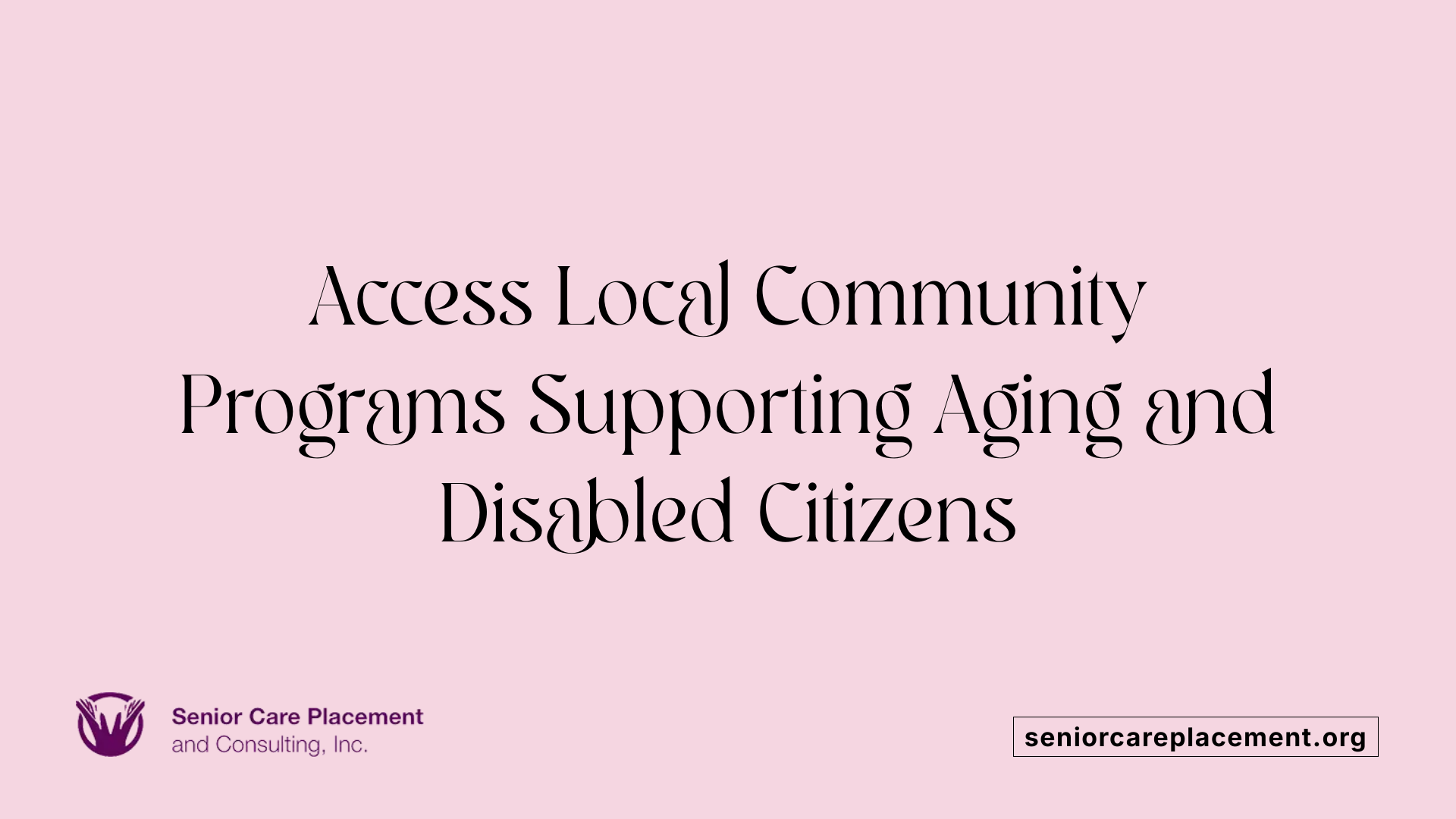How to Find Senior Care That Accommodates Special Needs
Ensuring Personalized Care for Seniors with Unique Needs

Navigating the Landscape of Specialized Senior Care
Finding the right senior care that accommodates specific disabilities and health concerns requires a comprehensive understanding of available options, resources, and quality standards. As societal shifts favor aging in community settings and legal rulings support independent living, families and caregivers must be equipped with targeted information to make informed decisions. This article explores the broad spectrum of senior care services, community resources, and strategies to assess and select appropriate, high-quality care tailored to individuals with complex or unique needs.
Educational Resources on Senior Care Settings for Special Needs
 Understanding the different types of senior care environments that can accommodate special needs is crucial for families and caregivers planning long-term care. There are various settings designed to support individuals with disabilities or complex health conditions, offering personalized assistance to promote safety, independence, and well-being.
Understanding the different types of senior care environments that can accommodate special needs is crucial for families and caregivers planning long-term care. There are various settings designed to support individuals with disabilities or complex health conditions, offering personalized assistance to promote safety, independence, and well-being.
Types of Senior Care Settings Capable of Accommodating Special Needs
| Care Environment | Description | Typical Residents | Equipment & Support Features |
|---|---|---|---|
| Group Homes | Small, community-based residences providing social opportunities and flexible assistance. | Adults with disabilities, autism | Moderately accessible, customized care plans, social activities |
| Assisted Living Facilities | Apartments with supportive services like medication management and daily assistance. | Elderly or neurological conditions | Universal design features, emergency call systems |
| Skilled Nursing Facilities | Medical institutions offering 24/7 skilled nursing and specialized medical care. | Those with intensive medical needs | Medical equipment, trained staff, advanced mobility aid support |
| In-Home Care Services | Personalized care within a person's own home, including personal care and chores. | Various, including post-surgery | Assistive technologies (medical alert systems), home modifications |
Assistive Technologies and Adaptive Strategies
Advancements in technology have significantly improved safety and independence for those with special needs. Devices like medical alert systems, emergency ID bracelets, and environmental controls enable quick responses during emergencies. Home modifications such as grab bars, improved lighting, and wheelchair-accessible doors help create safer living spaces. Planning ahead with assessments from geriatric care managers can ensure proper adaptation of the environment.
Classes and Informational Programs Available for Caregivers and Professionals
Many organizations provide educational programs, workshops, and classes catering to caregivers, healthcare professionals, and families. These include:
- Do2Learn: Offers comprehensive materials on social skills, communication, and behavior management tailored to individuals with special needs.
- Inova Well and Joanne G. Crantz Geriatric Resource Center: Provide classes on wellness, safety, and independence for seniors.
- ElderLink: Offers training on elder care management and specialized support services.
These educational resources aim to improve the quality of care, promote best practices, and foster understanding of unique needs in different care environments.
For ongoing education and support, families can also explore resources provided by autism associations, dyslexia organizations, and the Center for Parent Information and Resources. These groups provide targeted guidance on legal rights, advocacy, and education related to disabilities.
If you're seeking more detailed information, searching terms like "Senior care environments for individuals with disabilities and health concerns" can lead you to additional local and national resources that assist in choosing suitable care options for special needs seniors.
Resources and Guidance for Seniors with Special Needs and Families

What resources and guidance are available for seniors with special needs and their families?
For families caring for seniors with special needs, numerous resources and support systems are accessible to help improve quality of life and promote independence. Local aging and disability agencies play an essential role in this network. One prominent example is the Aging and Disability Resource Connection (ADRC), which provides comprehensive counseling, referral services, and care planning tailored to individual needs.
These organizations assist in navigating complex systems, offering guidance on available home and community-based services such as personal care, transportation, meal programs, and assistive technologies. Such services are designed to foster safety and support at home, helping seniors maintain their independence as long as possible.
Legal safeguards and advocacy organizations are also vital components in protecting seniors’ rights. The Long-Term Care Ombudsman and Elder Rights programs advocate for seniors, investigate reports of abuse or neglect, and ensure proper treatment and community integration.
In addition to local agencies, several online platforms serve as valuable resources. The Eldercare Locator, for instance, enables users to search by zip code to connect with local services and support agencies.
Community programs, including adult day centers, respite care, and social activities, are facilitated through community centers and nonprofit organizations like The Salvation Army. These services reduce loneliness, promote social engagement, and help families manage caregiving responsibilities.
Support programs specifically designed for special needs—such as mobility assistance, home modifications, and adaptive equipment—play a crucial role in enhancing daily living. Furthermore, counseling and planning services help families prepare for future needs, including legal advice on managing finances and health directives.
Overall, a coordinated effort involving government agencies, community organizations, and online resources ensures that seniors with disabilities and their families receive the necessary help to promote safety, independence, and well-being.
Types of Elder Care Services for Individuals with Disabilities
 Elder care services suitable for individuals with special needs encompass a wide range of specialized options designed to address specific health conditions and disabilities. These services aim to support independence while managing complex medical and daily living challenges.
Elder care services suitable for individuals with special needs encompass a wide range of specialized options designed to address specific health conditions and disabilities. These services aim to support independence while managing complex medical and daily living challenges.
In-home care services tailored for this population include personalized assistance such as bathing, grooming, medication reminders, mobility support, and engaging activities for clients with conditions like Alzheimer’s disease. Organizations like ElderCare 4 Families and OndeCare provide qualified caregivers trained to assist with these needs, ensuring safety and comfort within a familiar environment.
Facility-based options also play a significant role. Assisted living facilities offer private apartments combined with supportive services, ideal for those who need some help with daily activities but wish to maintain independence. Skilled nursing facilities provide 24/7 medical care for individuals requiring intensive supervision and treatment. Memory care units specifically serve seniors with cognitive impairments, offering specialized programs to promote well-being.
Community programs and temporary respite services help alleviate caregiver stress and provide social engagement for individuals with disabilities. Adult day care centers, volunteer programs, and meal delivery services foster social connections and nutritional support, enhancing overall quality of life.
Many services, such as elder respite care, are designed to provide temporary relief for caregivers, allowing them to rest while ensuring their loved ones receive safe, attentive care. This combination of in-home, facility-based, and community-based services creates a comprehensive network supporting individuals with various needs, helping them retain as much independence as possible.
Community Resources and Support Programs
 What community resources, support programs, and services assist aging and disabled citizens in choosing appropriate care options?
What community resources, support programs, and services assist aging and disabled citizens in choosing appropriate care options?
A broad network of community resources plays a vital role in helping seniors and individuals with disabilities find suitable care options. Local agencies on aging, such as the Area Agencies on Aging and state departments like the Virginia Department of Social Services, offer invaluable support through case management, referrals, healthcare guidance, housing assistance, transportation, and legal aid.
Specialized programs are designed to serve as trusted entry points to long-term services. For example, Aging and Disability Resource Centers (ADRCs) provide counseling, comprehensive information, and assistance in accessing benefits like home-delivered meals, Medicaid programs, and assistive technologies. These centers facilitate informed decision-making tailored to each individual's unique needs.
Organizations like the Eldercare Locator connect families with local services, while protection and advocacy systems work to uphold client rights and ensure safety.
Support groups and community engagement initiatives also foster social interaction, combat loneliness, and promote independence for seniors.
All these programs operate collaboratively across federal, state, and local levels to ensure older adults and disabled individuals receive accessible, personalized, and coordinated support. By utilizing these resources, families can better navigate complex care options, secure necessary benefits, and maintain an optimal quality of life.
| Resource Type | Offerings | Who It Helps | Examples |
|---|---|---|---|
| Local agencies | Case management, referrals | Seniors and disabled individuals | Area Agencies on Aging, Virginia DSS |
| Programs like ADRCs | Counseling, benefits access | Elderly, disabled, caregivers | Aging and Disability Resource Centers |
| Advocacy groups | Rights protection, community support | Vulnerable populations | State Protection and Advocacy systems |
| Community organizations | Social programs, activities | Older adults, social isolated seniors | Support groups, senior centers |
This network of resources ensures a comprehensive approach to elder and disability care, supporting both independence and well-being.
Guidance for Families in Making Informed Care Decisions
What guidance is available to help families make informed decisions about senior care options for individuals with disabilities?
When planning for senior and disability care, families can access a range of resources and expert advice to guide their decisions.
First, consulting healthcare professionals and specialists is essential. Medical providers can assess the individual’s particular needs, recommend appropriate treatments, and suggest suitable care settings.
Community resource centers, eldercare organizations, and advocacy groups provide valuable information about various care options, rights, and legal considerations. They also offer support and assistance in navigating paperwork and programs.
Researching care providers’ credentials, certifications, and reviews helps families find reputable services that meet safety standards and quality benchmarks. Online platforms, like Care.com or specialized directories, show caregiver experience, certifications such as CPR or first aid, and community ratings.
Legal and ethical considerations are critical—families should understand the importance of the individual’s autonomy. Options like supported decision-making allow seniors to participate in their care choices as much as possible. When necessary, guardianship arrangements must balance protection with respecting independence.
Understanding different housing options—like assisted living, group homes, or community-based programs—helps families determine what environment best supports their loved one. Data and insights on resident preferences and health monitoring can inform these decisions, aiming to enhance the individual’s quality of life.
By actively engaging with healthcare providers, doing thorough research, and respecting legal rights, families can develop personalized, respectful care plans that promote dignity, independence, and well-being.
For further guidance, searching for terms like "Informed decision-making for senior disability care" can connect families with additional resources, articles, and support networks.
Assessing and Ensuring Quality of Senior Care
How can families evaluate the quality and suitability of senior care services for individuals with special needs?
Families seeking senior care services for loved ones with special needs should start by investigating the credentials and expertise of the providers. Checking for proper certifications such as CPR, First Aid, and specialized training in disabilities like autism, cerebral palsy, or spinal injuries is vital.
Staff experience also plays a significant role. Caregivers with extensive background in caring for individuals with specific health challenges provide better support. It’s equally important to review safety protocols and accommodations within the care environment, ensuring accessibility and safety measures are in place.
Visit the facilities or observe in-home care settings to assess cleanliness, organization, and staff interactions. Family feedback and reviews from other clients can give insights into overall satisfaction and quality.
Comprehensive assessments by healthcare professionals, including evaluations of physical health, cognitive function, and daily living skills, assist in understanding the individual’s precise needs. This helps in tailoring personalized care plans that address specific challenges and improve quality of life.
Regulatory compliance is another crucial aspect. Confirm that the provider adheres to state and national licensing standards, and that all staff members pass background checks. This reduces safety risks and ensures professional standards are maintained.
Finally, open communication with care providers about their approach to fall prevention, medication management, psychosocial support, and emergency procedures ensures the care aligns well with the individual’s requirements and safety.
For families, a thorough evaluation combining these strategies offers the best assurance of choosing high-quality care that promotes safety, independence, and well-being for seniors with special needs.
Resources for further research
Looking for additional guidance? Use the search query "Evaluating quality senior care for special needs individuals" to find detailed resources, expert articles, and checklists designed to assist families in making informed decisions about senior care services.
Making Care Choices with Confidence and Compassion
Selecting senior care that effectively accommodates specific needs and disabilities is a multifaceted process that benefits from thorough research, careful assessment, and understanding of available resources. Engaging healthcare professionals, visiting facilities, reviewing caregiver credentials, and leveraging community support programs are crucial steps. Prioritizing the individual’s dignity, autonomy, and comfort ensures they receive respectful, personalized, and high-quality care. With access to diverse educational resources, advocacy organizations, and expert guidance, families can navigate the complex landscape of elder care confidently, ultimately securing living arrangements and services that enhance quality of life and independence for their loved ones.
References
- Local Senior Care Services | Elderly Care - ElderCare 4 Families
- Disability & Special Needs Care Services in Louisville
- Best Special Needs Care Providers Near Me
- Housing Options for Adults With Special Needs
- Find Special Needs Adult Care in Louisville, KY
- Services for the Aging | The Salvation Army USA
- Special Needs Care | Tailored Support For Unique Needs - OndeCare
- Aging in Place: Growing Older at Home
- Eldercare Locator






































































































